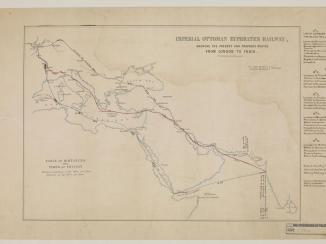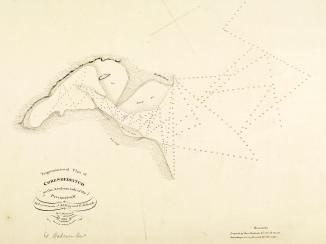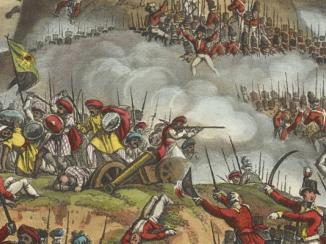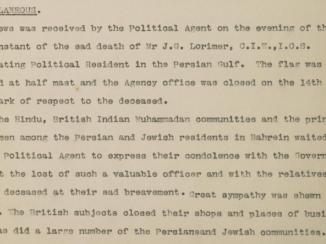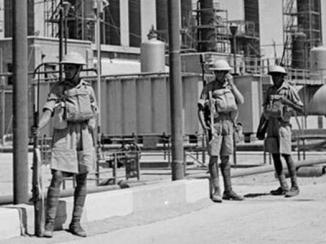Treaty with the Ameers of Sind; and Persian Gulf Affairs
IOR/L/PS/5/369, ff 5A-71
134 items in this record
Search within this record
The record is made up of 1 item (68 folios). It was created in 25 May 1821. It was written in English. The original is part of the British Library: India Office The department of the British Government to which the Government of India reported between 1858 and 1947. The successor to the Court of Directors. Records and Private Papers Documents collected in a private capacity. .
About this record
- Content
This item comprises enclosures to a despatch from the Government of Bombay From c. 1668-1858, the East India Company’s administration in the city of Bombay [Mumbai] and western India. From 1858-1947, a subdivision of the British Raj. It was responsible for British relations with the Gulf and Red Sea regions. [Mumbai] Secret Department to the Secret Committee Pre-1784, the Committee responsible for protecting East India Company shipping. Post-1784, its main role was to transmit communications between the Board of Control and the Company's Indian governments on matters requiring secrecy. : Bombay Secret Letter 25 May 1821. The enclosures are dated 20 December 1820-12 May 1821. (Attached to folio 5 is a note, f 5a, stating that the ‘Enclosure in Bombay Secret Letter of 18th October 1820 is missing’).
The initial enclosure (numbered 1) is a letter dated 10 February 1820 from George Swinton, Secretary to the Government at Fort William, to Francis Warden, Chief Secretary to the Government, Bombay, conveying the Governor-General’s pleasure that the threatened rupture of relations between the British Government and the Ameers of Sind [Amirs of Sindh] has been averted and a treaty negotiated, and approbation of Captain Sadler who was sent as an envoy to Hyderabad to restore good relations.
The remaining enclosures, with their relevant enclosures, are: despatches from Henry Willock, HM Chargé d’Affaires in Tahran [Tehran] to the Marquis of Hastings, Governor-General of Bengal; despatches from H R Deschamps, Acting Political Agent A mid-ranking political representative (equivalent to a Consul) from the diplomatic corps of the Government of India or one of its subordinate provincial governments, in charge of a Political Agency. and Captain Commanding at Kishma [Qeshm, also spelled Kishm and Kishmee in this item], to Francis Warden; and instructions issued by Warden to Dr Andrew Jukes with relevant enclosures. They relate to the complaint by Persia [Iran] about the British occupation of the island of Kishm, and comprise the following groups of papers:
(1) Willock’s correspondence with the Persian Prime Minister and with the Minister for Foreign Affairs, in which Willock disputes the Persian contentions on the following points:
- Whether the occupation of Kishm is a violation of Article 11 of the Treaty between Persia and Britain (prohibiting British ships of war going to Persian ports without express permission)
- Whether the Imaum [Imam] of Muscat, had the right to authorize the relocation of the British detachment at Rosul-Khyma [Ra's al-Khaymah, also spelled Ras-sol-Khyma in this item] to Kishm and Hengaum [Hengam] and if Muscat is a dependency of Bunder Abassi [Bandar Abbas] and hence of Persia
- Whether it is the prerogative of the Prince of Fars to take steps to prevent ‘piracy’ (of the Joasemees [ al-Qawāsim One of the ruling families of the United Arab Emirates; also used to refer to a confederation of seafaring Arabs led by the Qāsimī tribe from Ras al Khaima. ]) and ensure security in the Persian Gulph [Gulf] or if a permanent British naval presence was and is more effective
- Whether Captain William Bruce, Political Resident A senior ranking political representative (equivalent to a Consul General) from the diplomatic corps of the Government of India or one of its subordinate provincial governments, in charge of a Political Residency. in the Persian Gulph [Gulf], should be removed from his post (and pay reparation for damaged and lost property) for interfering at Bahrein [Bahrain] in efforts to suppress ‘piracy’ which were the business of the Prince of Sheraz [Shiraz] and the Imaum of Muscat; and for being responsible for the ‘unwarranted’ seizing of the arms of 300 men of Lingua [Bandar-e-Lengeh] and fourteen of their boats which were all destroyed following a storm, and for the burning of ships at the port of Charack [Bandar-e Chārak, also spelled Charak in this item], in alleged retaliation for attacks on British subjects.
The correspondence also covers Willock’s attempts to: dissuade or delay the sending of Persian representatives to Kishm and Bombay, respectively, to ask the British to leave Kishm and to remonstrate over the occupation to the Government of India; and to exonerate Captain Bruce from responsibility for the events at Lingua and Charack.
(2) Letters from the Acting Political Agent A mid-ranking political representative (equivalent to a Consul) from the diplomatic corps of the Government of India or one of its subordinate provincial governments, in charge of a Political Agency. and Captain Commanding at Kishma, to the Chief Secretary to the Government, Bombay, reporting that he has placated the vakeel sent with a letter (ff 29-30) by the Hussin Ally, Prince of Shiraz [Husayn 'Ali Mīrzā A title of honour originally applied to princes, later to military leaders, and later still to secretaries, chieftains, and other ‘gentlemen’. Farmānfarmā, Prince-Governor A Prince of the Royal line who also acted as Governor of a large Iranian province during the Qājār period (1794-1925). of Fārs] and that he has received intelligence that the Prince is amassing a force of 12,000 near Bunderabbas [Bandar Abbas], which could not be repulsed by the small British military establishment on the island (detailed on f 30).
(3) Detailed background and instructions (ff 34-43) to Dr Jukes issued by the Government of Bombay From c. 1668-1858, the East India Company’s administration in the city of Bombay [Mumbai] and western India. From 1858-1947, a subdivision of the British Raj. It was responsible for British relations with the Gulf and Red Sea regions. for his mission to the Persian Gulph in which he is to allay the claims and suspicions of Persia and conduct himself as the situation, however it develops, may warrant. In particular Jukes is instructed: to investigate the claims of the Imaum of Muscat and Persia to the island of Kishma; verify whether the Prince of Shiraz has amassed a force near Bunder Abbas; direct the detachment to withdraw to Muscat if hostilities look inevitable; how to act with regard to Captain Bruce; to be the Political Agent A mid-ranking political representative (equivalent to a Consul) from the diplomatic corps of the Government of India or one of its subordinate provincial governments, in charge of a Political Agency. at Kishme on the recall of Captain Thompson. The instructions are accompanied by copies of letters of authority, introduction and information (ff 44-65), including: letters from the Government of Bombay From c. 1668-1858, the East India Company’s administration in the city of Bombay [Mumbai] and western India. From 1858-1947, a subdivision of the British Raj. It was responsible for British relations with the Gulf and Red Sea regions. addressed to Willock, the King [Shah] of Persia, the Prince of Sheeraz [Shiraz] and the Imaum of Muscat; detailed report by Major-General Lionel Smith, dated 23 April 1821, on the advantages of Kishme and how to best use it to check ‘piracy’ and in general how to police the Gulph (ff 48-57); and letters to the Officer Commanding the Troops and Acting Political Agent A mid-ranking political representative (equivalent to a Consul) from the diplomatic corps of the Government of India or one of its subordinate provincial governments, in charge of a Political Agency. , and the Officer Commanding HC [Honourable Company] Cruisers at Kishm.
The last enclosure ends with a list of the four enclosures comprising Bombay Secret Letter 25 May 1821.
- Extent and format
- 1 item (68 folios)
- It is part of
- 557 imagesRef: IOR/L/PS/5/369
- Arrangement
The despatch comprises enclosures numbered 1-4. The enclosure number is written for reference on the verso The back of a sheet of paper or leaf, often abbreviated to 'v'. of the last folio of each enclosure.
- Written in
- English in Latin script
- Type
- Archival item
Archive information for this record
- Original held at
- British Library: India Office The department of the British Government to which the Government of India reported between 1858 and 1947. The successor to the Court of Directors. Records and Private Papers Documents collected in a private capacity.
- Access conditions
Unrestricted
- Archive reference
- IOR/L/PS/5/369, ff 5A-71
- Date(s)
- 25 May 1821 (CE, Gregorian)
- Related primary sources
Duplicates of these letters are catalogued as IOR/L/PS/9/69/47-49, 51-52 and 77-78.
Access & Reference
History of this record
Related material
Related search terms
- Subjects
- PiracyDiplomatic protestsDiplomacyTerritorial rightsNaval basesSeizure of vessels and cargoesMilitary intelligenceMilitary occupation
- Places
- BahreinPersian GulfCharakLinguaKishm
- People & organisations
- Government of Bombay, Chief SecretaryImam of OmanPolitical Agent for the Lower GulfPolitical ResidentPrince-Governor of FārsHM Chargé d'Affaires to PersiaAmir of Lower SindhGovernment of Bengal
Use and share this record
- Share this record
- Cite this record in your research
Treaty with the Ameers of Sind; and Persian Gulf Affairs, British Library: India Office Records and Private Papers, IOR/L/PS/5/369, ff 5A-71, in Qatar Digital Library <https://www.qdl.qa/node/9583> [accessed 30 January 2025]
- Link to this record
https://www.qdl.qa/en/archive/81055/vdc_100122005751.0x00000c
- IIIF details
This record has a IIIF manifest available as follows. If you have a compatible viewer you can drag the icon to load it.https://www.qdl.qa/en/iiif/81055/vdc_100000000319.0x0000b8/manifestOpen in Universal viewerOpen in Mirador viewerMore options for embedding images
Copyright: How to use this content
- Reference
- IOR/L/PS/5/369, ff 5A-71
- Title
- Treaty with the Ameers of Sind; and Persian Gulf Affairs
- Pages
- 9v:13v, 14r, 21r:26r
- Author
- Hajji Mohammad Hossein Isfahani
- Usage terms
- The copyright status is unknown. Please contact [email protected] with any information you have regarding this item.
- Reference
- IOR/L/PS/5/369, ff 5A-71
- Title
- Treaty with the Ameers of Sind; and Persian Gulf Affairs
- Pages
- 9v:13v, 21r:26r
- Author
- Nishāt Isfāhānī, Mīrzā Abdul Wahāb, Mu'tamid al-Dawla
- Usage terms
- The copyright status is unknown. Please contact [email protected] with any information you have regarding this item.
- Reference
- IOR/L/PS/5/369, ff 5A-71
- Title
- Treaty with the Ameers of Sind; and Persian Gulf Affairs
- Pages
- 5ar, 5v:9r, 14v:20v, 26v:71v
- Author
- East India Company, the Board of Control, the India Office, or other British Government Department
- Usage terms
- Open Government Licence






































































































































